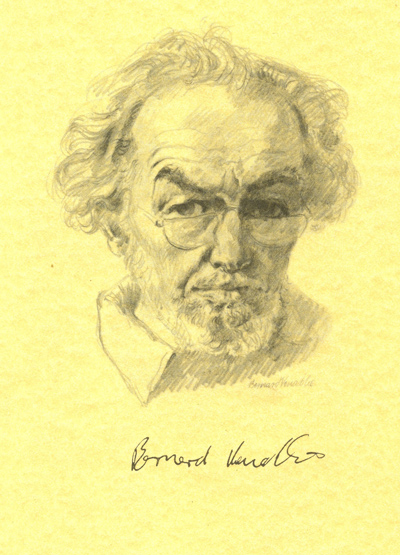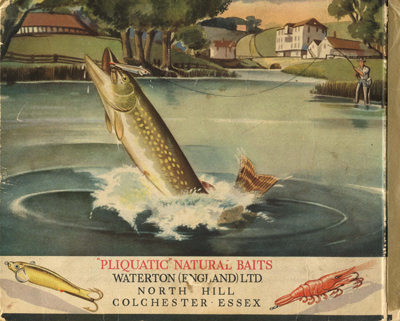Bernard Venables was born in
Catford in 1907 and started a career as a graphic artist in the Daily Express
newspaper in 1937. He had a chance
meeting in a pub with Sylvester Bolam who was Deputy Editor of the Daily
Mirror, and they discussed fishing. Subsequently, in 1946 he joined the paper.
 The Daily Mirror was running a
competition for readers to describe their dream trip, and Bernard drew a
cartoon strip to illustrate their stories.
The Daily Mirror was running a
competition for readers to describe their dream trip, and Bernard drew a
cartoon strip to illustrate their stories.
When interest in this had
petered out, it was decided to produce a cartoon strip on gardening. The text
was written by another famous angler, Jack Hargeaves and the fictional gardener
featured was given the name of Mr. Crabtree. The series wasn’t enthusiastically
received, even when the writer was changed for a much more knowledgable
gardener, and so it was cut.
It was decided that this
should be replaced with a fishing cartoon strip and so was born the Mr.
Crabtree we all came to love. Bernard was an enthusiastic fisherman and so
didn’t need a script writer and created Peter as Mr. Crabtee’s son to help
explain different techniques of fishing across various venues. Bernard often
said that Mr Crabtree was written just as he would have fished and they were
basically the same person.
It was at this time that the
existing Editor of the Daily Mirror retired and Bolam was appointed to the
position. One of his first actions was to appoint Bernard as “Angling
Correspondent” and said he should only come into the office one day every week,
and that his output would not be screened by sub-editors.
It was the first position of
this type and Bernard said he saw his new role as raising the profile of the
sport and serving the brotherhood of anglers everywhere.
In 1948, the idea was conceived
to collate the cartoons into a book which was then published in 1949,
accompanied by atmospheric colour illustrations and additional text.
 The first edition of the book
‘Mr. Crabtree Goes Fishing’ was
produced with a picture of a chub held in what became known Crabtree-style net
on the front cover and a leaping pike on the rear, and these are highly
collectible.
The first edition of the book
‘Mr. Crabtree Goes Fishing’ was
produced with a picture of a chub held in what became known Crabtree-style net
on the front cover and a leaping pike on the rear, and these are highly
collectible.
Such was the demand that it
was subsequently re-published to meet the huge demand with the chub on the
front and the rear. These are still sought after by the millions of anglers who
remember the book from their childhood.
This iconic book, now
celebration its 70th birthday became a classic publication, perhaps
the most famous fishing book after The
Compleat Angler.
It quickly sold more than two
million copies, and the plates used in production, started to wear out (after
Bernard had left the paper) so it was reproduced as “Fishing with Mr. Crabtree in all Waters”. The badly worn chapters
were omitted and replaced by conventional text and photographs about sea
fishing. Bernard wrote about how he found these changes awful and utterly out
of keeping with the original book.
Despite the book being a
runaway success, Bernard was employed as a member of staff and so all his work
was the property of the Daily Mirror and he received no additional monies for its
creation, in fact the Daily Mirror exploited it by producing books such as ‘Mr Crabtree’s Guide to Good Fishing Tackle’ in 1969, long after
he had left.
Bernard left the daily Mirror
to create the Angling Times and while working there produced the cartoon strip
of Mr. Cherry and Jim. This was along very similar lines but never reached the
heights of Mr. Crabtree.
In 1961 Bernard had a
disagreement with Angling Times and they parted company. He went on to create Creel, in July 1963, one of the first
colour angling magazines with contributions by anglers who were then household
names.
In 1995 he was awarded an MBE
Bernard died in 2001 and was
buried in a wicker (creel style) coffin. He was one of the outstanding
contributors to the angling scene in the twentieth century, but to generations
of anglers he will always be fondly remembered as Mr. Crabtree.
Keith Armishaw